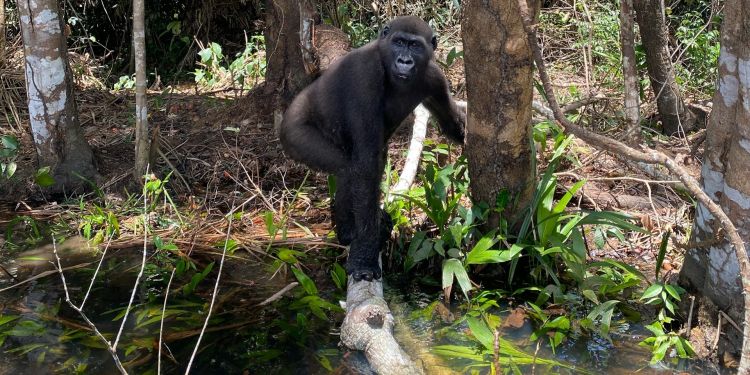Scientists call for a major investigation into Congo Basin

Leading researchers have launched a major scientific initiative to investigate and protect the fragile Congo Basin Forest in central Africa, one of the world’s most important ecosystems.
They say the Congo Basin Science Initiative will transform the understanding of the Congo Basin, an area of 240 million hectares of contiguous tropical forests that absorb a vast quantity of carbon, helping to moderate the impact of global climate change.
The initiative has been launched at the Three Basins Summit, a major gathering of political leaders and international organisations in Brazzaville, Republic of the Congo to discuss the world’s tropical forest regions.
There is a stark difference between what scientists know about the Congo Basin and what they know about the Amazon rainforest in South America.
At the summit, leading researchers including Professor Simon Lewis, a prominent expert on the Congo forests from the University of Leeds and University College London, highlighted the stark difference between what scientists know about the Congo Basin and what they know about the Amazon rainforest in South America, which has been the subject of intense scientific enquiry through the Large-Scale Biosphere-Atmosphere (LBA) experiment.
Involving 120 projects and 1700 researchers, the decade-long scheme in the Amazon has revealed the critical role that the Amazon rainforest plays in regulating the Earth’s climate. It has also helped train local scientists and has put Brazil at the forefront of rainforest science.
The researchers meeting in Brazzaville aim to replicate that approach with the creation of the Congo Basin Science Initiative.
Professor Raphael Tshimanga, a leading expert on the Congo Basin based at the University of Kinshasa in the Democratic Republic of the Congo said: "The Congo Basin is a vast and important area that straddles central Africa, the world’s second green lung after the Amazon.
“If we can replicate what has been achieved through investing in research in the Amazon, we will be in a much stronger position to understand the threats to this unique African ecosystem not only from climate change but also from deforestation and pollution from mining and oil exploration.”
Key scientific questions
Scientists have drawn up key scientific questions that need to be answered to assess the health of the Congo Basin forests.
Professor Lewis, who helped to develop the science plan for the initiative with scientific colleagues in the Congo region, said: “In the Amazon, scientists have uncovered a tipping point where beyond a certain level of deforestation and climate change, a mass die-back of the southern and eastern parts of the Amazon will occur.
“In the Congo Basin, scientists do not know if there is a tipping point, because we do not yet have the data to investigate this.”
Underinvestment in Congo Basin science
The scientists argue that there has been “severe underinvestment” in the science to understand the Congo Basin and many barriers to researchers leading high-level studies.
In recent years, only 11% of international funding for forest protection and sustainable management in tropical areas has been channelled to projects in the Congo Basin, whereas 34% went to the Amazon and 55% to Southeast Asia.
The Congo Basin was one of only two locations in the world without sufficient data to assess past trends in extreme heatwaves.
The lack of investment meant that in the latest Intergovernmental Panel on Climate Change (IPCC) global climate assessment, the Congo Basin was one of only two locations in the world without sufficient data to assess past trends in extreme heatwaves.
The meeting in Brazzaville is calling for $100 million to be invested in a ten-year science programme focussed on the Congo Basin region, with a further $100 million to give PhD training to scientists from the region. Once qualified, those scientists will be able to lead and coordinate complex studies.
Funding would have to come from international donors, UN agencies and philanthropists. The researchers say with international spending on research and development hitting $2.4 trillion in 2020, their ask to understand and protect the world’s second tropical forest is relatively modest.
Professor Lewis added: “Central Africa needs more scientists who can monitor the forests, rivers and climate of the region. Central Africa needs more scientists who can advocate for evidence-based policy, so that these countries can develop and become prosperous, but without the mass-scale destruction of nature that has occurred in places like the UK.”
Congo Basin
The Congo Basin forests are a global biodiversity hotspot and home to elephants, gorillas, chimpanzees and bonobos. Rainfall from the region is recycled by the forests and transported beyond central Africa, feeding rivers that are used by 300 million people as far afield as Ethiopia and Egypt.
Major discoveries are being made in the Congo Basin, with scientists recently mapping the world’s largest tropical peatland and many species that are new to science, with recent finds including a new species of gecko, an air-breathing catfish and a new species of coffee.
Experts fear as the climate gets warmer, that process could see the undisturbed Congo basin’s forests switch from being one of the world’s biggest absorbers of carbon to an emitter of carbon, with a knock-on effect that would make climate change worse.




